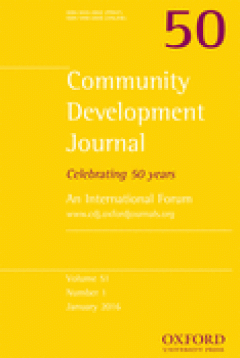Filter by

Cork as canvas: exploring intersections of citizenship and collective memory …
Urban space has the potential to shape people's experience and understanding of the city and of the culture of a place. In some respects, murals and allied forms of wall art occupy the intersection of street art and public art; engaging, and sometimes, transforming the urban space in which they exist and those who use it. While murals are often conceived as a more ‘permanent’ form of painted ar…
- Edition
- Volume 50, Number 1 January 2015, pages 138-152
- ISBN/ISSN
- 0010-3802
- Collation
- -
- Series Title
- Community Development Journal
- Call Number
- -

Is there a role for marketing in community development?
Social marketing is the application of marketing theory to social issues. A significant drawback, though, is that practitioners are encouraged to assume high levels of agency among their target audiences, often while developing programmes aimed at very disadvantaged groups. However, some social marketers work openly and collaboratively at neighbourhood level to co-create change with the people …
- Edition
- Volume 50, Number 1 January 2015, pages 153-167
- ISBN/ISSN
- 0010-3802
- Collation
- -
- Series Title
- Community Development Journal
- Call Number
- -

Building peace through social change communication: participatory video in co…
This paper draws on the experience of conducting participatory video in the Rift Valley of Kenya after the 2007–2008 post-election crisis, when the country underwent a period of intense ethnic violence. By linking development communication to conflict transformation theory, this article offers a framework that highlights the impact that communication for social change can have in post-conflict …
- Edition
- Volume 50, Number 1 January 2015, pages 121-137
- ISBN/ISSN
- 0010-3802
- Collation
- -
- Series Title
- Community Development Journal
- Call Number
- -

Build a fruit tree orchard and they will come: creating an eco-identity via c…
The theories of eco-identity, community development and community service gardening activities were addressed in the current study. The project explored how ecologically based gardening and fruit tree-planting activities helped to establish and define an eco-identity among diverse participants. Participants consisted of student volunteers and community members (n = 52) who were assigned a varie…
- Edition
- Volume 50, Number 1 October 2015, pages 104-120
- ISBN/ISSN
- 0010-3802
- Collation
- -
- Series Title
- Community Development Journal
- Call Number
- -

Mind the Gap! The growing chasm between funding-driven agencies, and social a…
The field of human services is increasingly adopting narrow practice approaches, driven by contemporary funding priorities. Such approaches reflect a reductionist understanding of human need, and run contrary to the wisdom, accumulated knowledge, experience, evidence and ethics of social and community development work. Drawing from a small group of refugee women's accounts of everyday challenge…
- Edition
- Volume 50, Number 1 January 2015, pages 88-103
- ISBN/ISSN
- 0010-3802
- Collation
- -
- Series Title
- Community Development Journal
- Call Number
- -

Indigenous community enterprises in Chiapas: a vehicle for buen vivir?
Buen vivir is an indigenous conception of well-being that has recently entered the Latin American debate on development. Overcoming the mainstream Western conception of development based mainly on economic growth, buen vivir emphasizes the importance of indigenous culture, the natural environment, and collective well-being. This article reports on an ethnographic study of self-managed grass-roo…
- Edition
- Volume 50, Number 1 January 2015, pages 71-87
- ISBN/ISSN
- 0010-3802
- Collation
- -
- Series Title
- Community Development Journal
- Call Number
- -

I thought this was a Christian thing? Exploring virtuous and exclusionary cyc…
The role of faith groups as welfare providers has received notable attention in the past few years as religious groups have become increasingly active in the voluntary sector. Developing Baker's ideas on ‘local performative theologies’, we examine data from semi-structured interviews focusing on Christian interdenominational networks and forms of collaboration which underpin faith-based project…
- Edition
- Volume 50, Number 1 January 2015, pages 40-54
- ISBN/ISSN
- 0010-3802
- Collation
- -
- Series Title
- Cummunity Development Journal
- Call Number
- -

Participatory community development: evidence from Thailand
Participation in community development is the key to promoting efficiency, accountability, and transparency in resource allocations for community development, resulting in fewer problems of social inequality. Many ‘participatory’ development projects, however, have not been successful in arousing participation among community members. In many such cases, cultural values and social norms are key…
- Edition
- Volume 50, Number 1 January 2015, pages 55-70
- ISBN/ISSN
- 0010-3802
- Collation
- -
- Series Title
- Community Development Journal
- Call Number
- -

Constructing communities: the community centre as contested site
Drawing on original empirical research and theories of cultural geography, this article investigates the multiple ways community is produced, understood and valued through a closer interrogation of the community centre as a contested site. The paper investigates the symbolism of the buildings [see Dovey, K. (1999) Framing Places: Mediating Power in Built Form. Routledge, London] as they are cla…
- Edition
- Volume 50, Number 1 January, pages 24-39
- ISBN/ISSN
- 0010-3802
- Collation
- -
- Series Title
- Community Development Journal
- Call Number
- -

Decentralization on the ground: challenges and opportunities for social work …
Decentralization has been a key reform implemented in post-communist countries after 1989. The shift from centralized to decentralized governance is associated with several expectations, such as improved quality of public services and increased government accountability. Social work practitioners can play a pivotal role in decentralization processes, serving as educators, advocates, and communi…
- Edition
- Volume 50, Number 1 January 2015, pages 10-23
- ISBN/ISSN
- 0010-3802
- Collation
- -
- Series Title
- Community Development Journal
- Call Number
- -

The practice of evaluation as an evaluation of practices
This article describes the theoretical basis and characteristics of a process-based, negotiated and generative approach to the evaluation of organizations. Illustrated by a case study, it highlights the inappropriateness of standardized instruments in the face of complexity and uncertainty, suggesting ways to improve the practice of evaluating dynamic complex systems. It underlines how conducti…
- Edition
- Volume 21, Number 4 October 2015, pages 497-512
- ISBN/ISSN
- 1356-3890
- Collation
- -
- Series Title
- Evaluation
- Call Number
- -

Taking stock of complexity in evaluation: A discussion of three recent public…
- Edition
- Volume 21, Number 4 October 2015, pages 481-491
- ISBN/ISSN
- 1356-3890
- Collation
- -
- Series Title
- Evaluation
- Call Number
- -
- Edition
- Volume 21, Number 4 October 2015, pages 481-491
- ISBN/ISSN
- 1356-3890
- Collation
- -
- Series Title
- Evaluation
- Call Number
- -

Theory in evaluation: Reducing confusion and encouraging debate
One of the goals of the journal Evaluation was to advance theoretical and methodological understandings of evaluation. Twenty years later theory as understood in the field of evaluation is fragmented, a problem widely recognized in the evaluation community. The goal of this article is to make a modest contribution to clarifying this situation. We first present two typologies of evaluation theor…
- Edition
- Volume 21, Number 4 July 2015, pages 467-480
- ISBN/ISSN
- 1356-3890
- Collation
- -
- Series Title
- Evaluation
- Call Number
- -

Future-oriented impact assessment: Supporting strategic decision-making in co…
The article proposes a systemic and future-oriented evaluation approach designed to support decision-making in complex socio-technical environments. The approach integrates established methods of evaluation, foresight, impact assessment, system dynamic modelling and societal embedding within a single framework to provide versatile information to increase strategic intelligence in decision-makin…
- Edition
- Volume 21, Number 4 October 2015, pages 448-461
- ISBN/ISSN
- 1356-3890
- Collation
- -
- Series Title
- Evaluation
- Call Number
- -

The contribution of process tracing to theory-based evaluations of complex ai…
This article focuses on methodological challenges in evaluating complex program aid interventions like budget support. We show that recent innovations in process-tracing methodology can help solve the identified challenges and increase the strength of causal inference made when using case studies in demanding settings. For the specific task of evaluating the governance effectiveness of budget s…
- Edition
- Volume 21, Number 4 October 2015, pages 429-447
- ISBN/ISSN
- 1356-3890
- Collation
- -
- Series Title
- Evaluation
- Call Number
- -

Using theories of change in the CGIAR Research Program on Agriculture for Nut…
Theories of change are increasingly being discussed and referenced in development evaluation even while the elements of what a theory of change consist of differ widely among applications. Equally, examples of actual use of theories of change other than as overview illustrations of interventions are rare. In this article, we present generic models of theories of change for both straightforward …
- Edition
- Volume 21, Number 4 October 2015, pages 407-428
- ISBN/ISSN
- 1356-3890
- Collation
- -
- Series Title
- Evaluation
- Call Number
- -

Integrating quasi-experimental and inductive designs in evaluation: A case st…
Evaluations of ‘natural experiments’ in public policy are typically considered ‘weak’ evidence. Challenges include: making credible claims for causal inference (internal validity); generalizing beyond the case (external validity); and providing useful evidence for decision makers. In public health, where experimental evidence is encouraged by funders and enjoys a degree of rhetorical favour, in…
- Edition
- Volume 21, Number 4 October 2015, pages 391-406
- ISBN/ISSN
- 1356-3890
- Collation
- -
- Series Title
- Evaluation
- Call Number
- -

Towards a comprehensive framework for the evaluation of small and medium ente…
This research demonstrates the relevance of the evaluative cycle and its diverse methodological designs in small and medium enterprise (SME) policy. We structure our arguments based on the most common phases of the cycle, namely policy justification, needs, policy theory, implementation, impact and efficiency assessments. We use an in-depth case study of public assistance to an SME to illustrat…
- Edition
- Volume 21, Number 3 July 2015, pages 359-375
- ISBN/ISSN
- 1356-3890
- Collation
- -
- Series Title
- Evaluation
- Call Number
- -

Developing expertise in managing dialogue in the ‘third space’: Lessons f…
Where two or more persons from different professions meet to discuss a shared project, a dialogic ‘third space’ is opened up. Such dialogues (or multilogues) can be problematic for reasons which are well attested to in the literature. Third spaces can be sites of hostility and defensiveness, or of creativity and learning. This article explores the nature and management of the third space, notin…
- Edition
- Volume 21, Number 3 July 2015, pages 344-358
- ISBN/ISSN
- 1356-3890
- Collation
- -
- Series Title
- Evaluation
- Call Number
- -

A holistic, learning-centred approach to building evaluation capacity in deve…
There is growing pressure on development organizations to improve their evaluation systems and capacities. This presents considerable challenges for time- and resource-poor organizations in developing countries. Evaluation capacity development (ECD) approaches are needed that are appropriate and effective for such organizations. We argue that this requires a long-term, holistic, participatory, …
- Edition
- Volume 21, Number 3 July 2015, pages 325-343
- ISBN/ISSN
- 1356-3890
- Collation
- -
- Series Title
- Evaluation
- Call Number
- -
 Computer Science, Information & General Works
Computer Science, Information & General Works  Philosophy & Psychology
Philosophy & Psychology  Religion
Religion  Social Sciences
Social Sciences  Language
Language  Pure Science
Pure Science  Applied Sciences
Applied Sciences  Art & Recreation
Art & Recreation  Literature
Literature  History & Geography
History & Geography